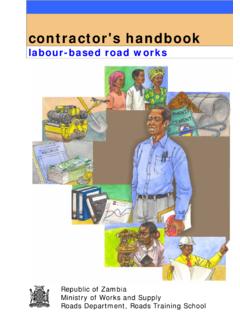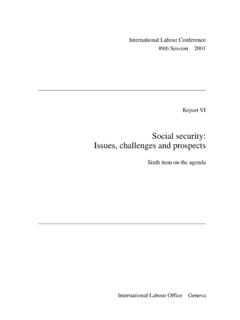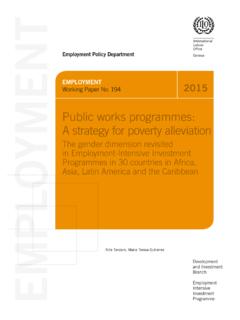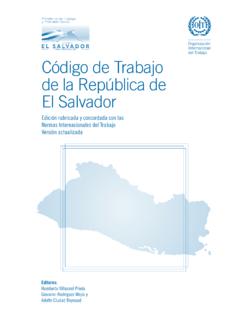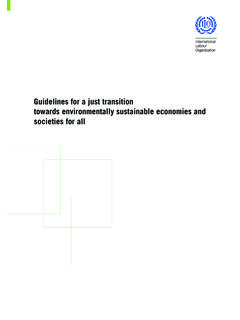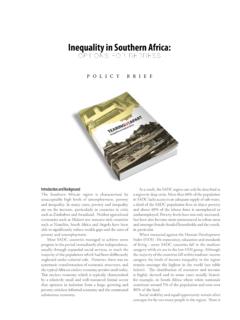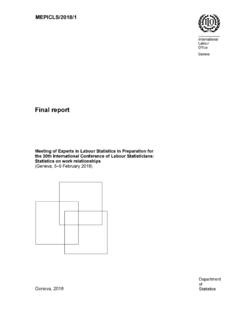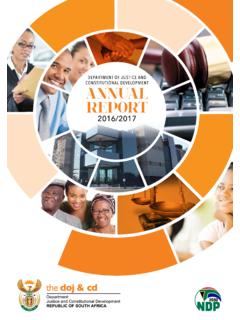Transcription of Conclusions on skills for improved productivity ...
1 Conclusions on skills for improved productivity , employment growth and development international labour conference , 2008 international labour Office Geneva Copyright international labour Organization 2008 First published 2008 Publications of the international labour Office enjoy copyright under Protocol 2 of the Universal Copyright Convention. Nevertheless, short excerpts from them may be reproduced without authorization, on condition that the source is indicated. For rights of reproduction or translation, application should be made to ILO Publications (Rights and Permissions), international labour Office, CH-1211 Geneva 22, Switzerland, or by email: The international labour Office welcomes such applications. Libraries, institutions and other users registered with reproduction rights organizations may make copies in accordance with the licences issued to them for this purpose.
2 Visit to find the reproduction rights organization in your country. Conclusions on skills for improved productivity , employment growth and development , international labour conference , 2008 / international labour Office. - Geneva: ILO, 2008 24 pp ISBN: 9789221217602; 9789221217619 (web pdf) international labour Office labour productivity / employment /vocational training/training policy/developed countries/developing countries Also available in French: Conclusions sur les comp tences en vue de stimuler la productivit , la croissance de l emploi et le d veloppement, Conf rence internationale du Travail, 2008 (ISBN 978-92-2-221760-1), Gen ve, 2008; in Spanish: Conclusiones sobre las calificaciones para la mejora de la productividad, el crecimiento del empleo y el desarrollo, Conferencia Internacional del Trabajo, 2008 (ISBN 978-92-2-321760-0), Ginebra, 2008. ILO Cataloguing in Publication Data The designations employed in ILO publications, which are in conformity with United Nations practice, and the presentation of material therein do not imply the expression of any opinion whatsoever on the part of the international labour Office concerning the legal status of any country, area or territory or of its authorities, or concerning the delimitation of its frontiers.
3 The responsibility for opinions expressed in signed articles, studies and other contributions rests solely with their authors, and publication does not constitute an endorsement by the international labour Office of the opinions expressed in them. Reference to names of firms and commercial products and processes does not imply their endorsement by the international labour Office, and any failure to mention a particular firm, commercial product or process is not a sign of disapproval. ILO publications and electronic products can be obtained through major booksellers or ILO local offices in many countries, or direct from ILO Publications, international labour Office, CH-1211 Geneva 22, Switzerland. Catalogues or lists of new publications are available free of charge from the above address, or by email: Visit our web site: Formatted by TTE: reference Printed in Switzerland iii Foreword Investing in education and skills for women and men to help economies achieve dynamic growth with quality jobs is a pressing priority throughout the globe.
4 At the 2008 international labour conference , the ILO s tripartite constituency of governments, employers and workers adopted a set of Conclusions squarely focused on this challenge. These Conclusions provide practical guidance for strengthening education, vocational training and lifelong learning as central pillars of employability for workers and sustainability for enterprises within the Decent Work Agenda. The Conclusions highlight how skills development can be an important tool for reducing poverty and exclusion and enhancing competitiveness and employability. It is increasingly clear that the vicious circle of inadequate education, poor training, low- productivity jobs and low wages traps the working poor and excludes young persons and workers from participating in economic growth . The Conclusions seek to engender instead a virtuous circle in which improving the quality and availability of education and training for women and men fuels the innovation, investment, technological change, enterprise development , economic diversification and competitiveness that economies need to accelerate the creation of more but also better jobs and thereby improve social cohesion.
5 The Conclusions aim to: help countries use skills development to maximize opportunities and mitigate the negative impact of global drivers of change such as technology, trade and climate change; integrate skills development into national and sectoral development strategies; build seamless pathways of education that connect basic education, vocational training, labour market entry and lifelong learning; extend access to education and training for those who are disadvantaged in society. Connecting skills development to these broader growth , employment and development strategies requires that governments, working with the social partners, build policy coherence in linking education and skills development to today s labour markets and to the technology, investment, trade and macroeconomic policies that generate future employment growth . This places a high premium on strong social dialogue, effective coordination among ministries, and improved communication between employers and training providers.
6 As the Conclusions recognize, skills development will not by itself lead to improved productivity and employment . Other critical factors include employment and productivity policies to influence the demand side of the labour market, respect for iv workers rights, gender equality, and health and safety standards; good labour relations and social dialogue; and effective social protection. In short, everyone has a role to play. The Conclusions help identify specific areas of action for governments, the social partners, as well as the ILO. The Office commits to playing its part in such critical areas as research, knowledge sharing, policy analysis, and facilitating dialogue and collaboration. These Conclusions are timely, stimulating and practical. They can help governments and societies improve the employability of workers, enhance the productivity and competitiveness of enterprises, and promote the inclusiveness of growth .
7 They can thus serve as a powerful catalyst for realizing the universal goal of Decent Work for all. At a time of profound global economic uncertainty, this challenge is even more urgent. I invite you to review the recommendations, share your insights, and continue working with us in tangible ways to promote skills for improved productivity , employment growth and development . Juan Somavia Director-General ILO v Preface Current thinking on development issues is going through a major intellectual and policy shift. Central to this change of mindset is the realization that reducing poverty in a sustainable way cannot be achieved by simply having high and sustained growth . There is also a need to put good labour market performance at the centre of economic and social policies to ensure that growth is inclusive and creates productive employment and decent jobs.
8 This realization has come from at least two sources: the disappointment with the standard policy packages of the past, focused on macroeconomic stabilization or just growth of GDP; and the failure of even many high- growth countries to translate this growth into better labour market outcomes and standards of living for the majority of their populations. Even in countries where economic growth has been high and sustained the labour market, outcomes have frequently not been satisfactory, not enough jobs have been generated (declining employment content of growth ), and too many of the jobs created are of low productivity and low pay in the informal economy. The poverty reduction paradigm behind the Millennium development Goals (MDGs) is also moving closer to a labour -market-centred approach. This is based on the reasoning that labour is the only asset of the poor and that a growth process that does not create more and better jobs with adequate social protection might fail to reduce poverty for a large proportion of people.
9 An educated and skilled workforce is a critical component of this new emphasis on labour markets and their performance. The ILO has for years been advising member States on skills development policies, and developing research and analysis in this area. skills development policies constitute a core element of the ILO s Global employment Agenda (GEA), the ILO s policy framework for the employment promotion objective of the Decent Work Agenda. The Human Resources development Recommendation, 2004 (No. 195), also provides guidance for effective skills and employment policies. Given the importance of these issues, the ILO s 2008 international labour conference (ILC) general discussion on how skills development could better serve the twin objectives of increasing the quantity of labour employed and the productivity of labour was timely. The 2008 ILC adopted, by tripartite agreement between workers, employers and governments, Conclusions that provide a forward-looking framework for strengthening linkages between skills , productivity , employment , development and decent work.
10 These Conclusions underscore the principle that effective skills development policies need to be integral components of national development strategies in order to prepare the workforce and enterprises for new opportunities and adopt a forward-looking approach to dealing with change. In order to successfully link skills to productivity , employment creation and development , skills development policies should target three objectives: matching supply to current demand for skills ; helping workers vi and enterprises adjust to change; and anticipating and delivering the new and different skills that will be needed in the future. The framework adopted in the Conclusions also identifies prime responsibilities for governments and the social partners, and establishes priorities for support from the Office in five areas: (1) to boost skills development at the workplace and along value chains; (2) to help manage global drivers of change; (3) to allow early identification of current and future skills needs to feed national and sectoral development strategies; (4) to link education, skills development , labour market entry and lifelong learning; and (5) to promote social inclusion by extending access to education and training for those who are disadvantaged in society.


